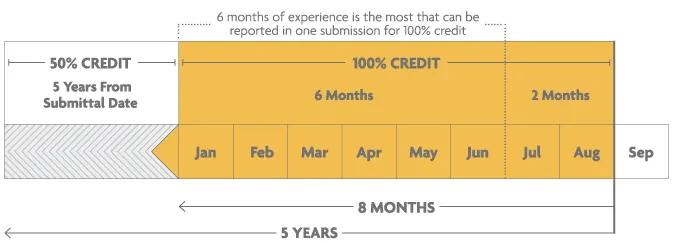Below are five examples of the Architectural Experience Program® (AXP®) reporting requirement—experience that must be reported within eight months to earn full credit toward the program’s requirements.
Review the chart and examples to understand how to use the reporting requirement, or learn more about the reporting requirement.
Note: Effective November 18, 2025, NCARB will update the reporting requirement to allow 100% credit for experience as old as one year, and 75% credit for experience older than one year. Learn more.

Example 1: Standard
To take full advantage of a reporting period while documenting a six-month period from January 1 to June 30, you would have through August 31 to report the experience. While the reporting period is a maximum of six months, the filing period allows you the two additional months of July and August to file reports for January through June.

Read the AXP Guidelines
Learn how to document your experience and see a list of all experience areas and tasks with the Architectural Experience Program® (AXP®) Guidelines.
If you miss the August 31 reporting date by one day (Sept. 1), then one day of full credit would be lost. The reporting period would be January 2 to June 30, with experience on January 1 still earning 50 percent credit.
From any given date, you can report back a total of five years, six months of which would count for full credit (if reported during the two-month filing period) and 4 years and 4 months would count for 50 percent credit.
You cannot create a single report that includes both the eight-month time frame for full credit and time reported beyond eight months for 50 percent credit. These reports must be split—one report for full credit and a separate report for 50 precent credit.
Example 2: Administrator or Supervisor Delay
Same example as above, but there is an incidental problem with the report or supplementary information is required and it takes additional time for you and NCARB to resolve. You may still count the six-month period for full credit once the problem is resolved and accepted by NCARB.
Example 3: Reporting Period Less Than Six Months
You choose to report every three months, rather than every six months.
Therefore, experience earned between January 15 and April 14 must be reported by June 14, two months after the end of the period being reported.
If, for any reason, you missed your intended filing date of June 14, you could extend the reporting period to anytime up until July 14 (the full six months available) and still earn full credit. Any experience earned beyond the deadline up to 5 years will earn 50 percent credit.
The new filing deadline will be two months from the new end date selected.
Example 4: Birth or Adoption of a Child
You have become a new parent or adopted a child on January 15. Before taking a leave of absence on January 1, you had completed six months of work (July 1 – December 31). Whereas you would normally be expected to file the experience report by February 28, following a documented and approved request, you would be given an additional six months (until August 31) to file this report. If you would like to request an extension, contact us within six months of the event.
Example 5: Active Military Duty
You have been called to active military duty on January 15. Before this event, you had worked until December 31, having completed six months of work (July 1 – December 31) that could be reported for credit. Whereas you would normally be expected to submit the experience report by February 28, following a documented and approved request, you would be given a reasonable extension for filing this report for full credit following the end of your active military duty. Credit at 50 percent can be earned five years back from the new extension date. If you would like to request an extension, contact us within six months of the event.
Example 6: Serious Medical Condition
Similar to Example 5, if you have experienced a serious medical condition, you could, with appropriate and approved documentation from a licensed medical doctor overseeing your care, be allowed a reasonable extension of the two-month filing period. Credit at 50 percent can be earned five years back from the new extension date. If you would like to request an extension, contact us within six months of the event.